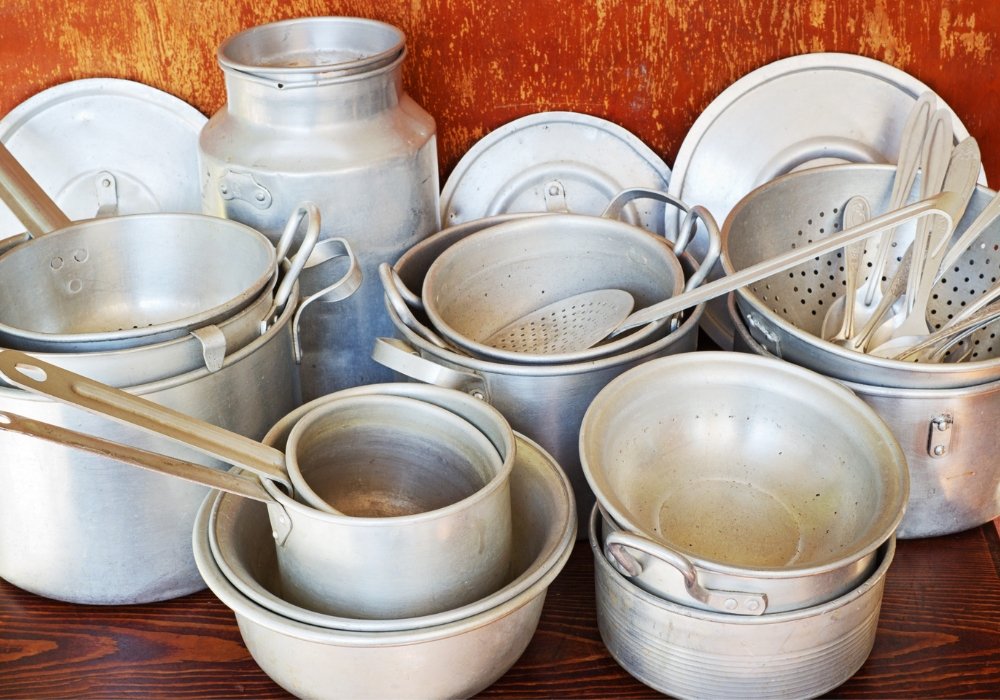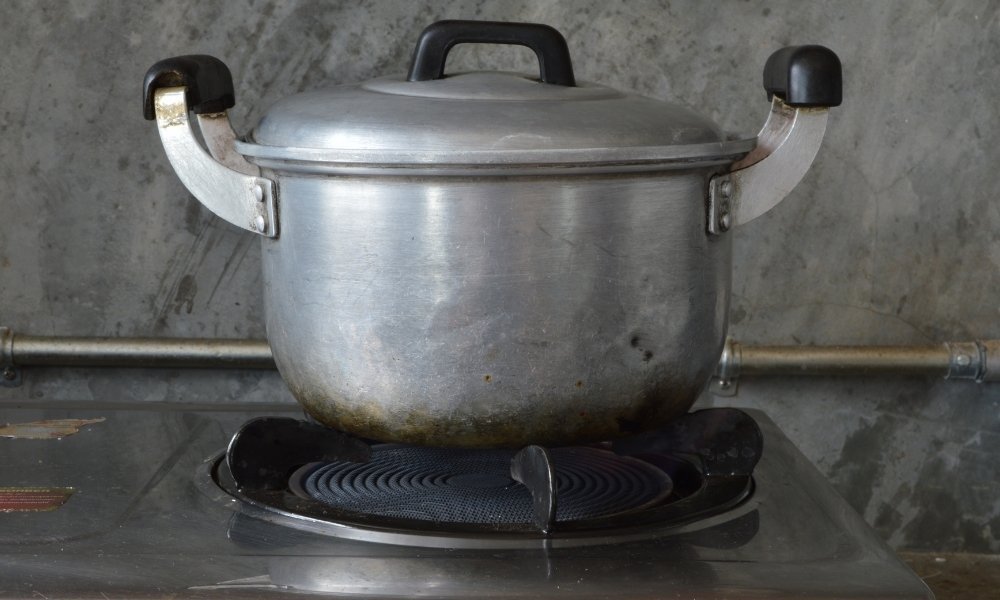Aluminium cookware – the most commonly used cookware across the globe since the 19th century. Besides the fact that aluminium cookwares are popular for being lightweight and its heat-conducting properties, it is also quite cost-effective.
Aluminium is abundantly found in nature. Hence, it is cheaper than cookware made of any other metal. To get a sense of this, just take a walk around in a market nearby where household items are sold. Chances are you will come across stacks of utensils in various shapes and sizes made of aluminium.
But, with more people becoming health conscious and wary about what they put in their system, it is only natural to ask if these cookware are safe without any long term ill-effect on our bodies.
To put our reader’s mind at ease right away – Aluminium cookware is safe. There is a caveat though; Aluminium reacts with acidic food which causes the metal to leach into the food. Having said that, the amount of aluminium that leaches into the food is minimal and poses no threat to the human body.
In fact, Aluminium is found in medicines like antacids. It is usually in a much higher dose than what would leach from Aluminium cookware. As per a fact-check by USA Today, our body absorbs less than 1% of aluminium in water and food and 95% of it is excreted by our kidneys. So, unless you have any sort of kidney ailments, you needn’t avoid aluminium cookware.
Concerns over aluminium and Alzheimer’s disease, Parkinson’s disease and Multiple Sclerosis have been raised several times. But there is no definitive evidence providing the causation or correlation. The Alzheimers’ Association too refutes this concern.
Further, aluminium is also used in many vaccines as an adjuvant. As of now, there is no clear link between aluminium and its health effects on humans.
Maintenance And Usage Of Aluminium Cookware

As mentioned earlier in the article, aluminium cookwares are the cheapest among all types of cookwares owing to their abundance in nature.
The metal is soft, light and malleable which allows it to be purposed for versatile applications. Aluminium cookware is low maintenance too. It heats evenly. So, there are no hotspots and it has a moderately stick-resistant surface.
However, it does have its share of problems too. Aluminium cookware reacts to acidic food which imparts a metallic taste to the food and spoils the utensil. They are not as durable as their steel or cast iron counterparts. With usage, the utensil will get bent or warped eventually. It is not recommended to use them on a high flame either. Also, it is advised to use wooden or silicone ladles while cooking as it tends to scratch easily.
However, its benefits outweigh the drawbacks by a big margin. As a result, it is the most widely used cookware across the globe. Whether it is someone’s home or a commercial kitchen, you are sure to find a whole bunch of aluminium cookware in their kitchen without fail.
Adopt the following tips to ensure your aluminium cookware lasts longer.
- Use wooden or silicon ladles or spoon while cooking.
- Cook in medium or low fire only.
- Do not cook acidic food.
- Use a sponge with soap and water to clean it.
- Of course, be gentle with the cookware since the metal is soft and can get dents quite easily.
Related reading: 7 Best Pressure Cookers In India
Health Concerns Over Aluminium Cookware And Alternatives

As mentioned there have been concerns about cooking food on aluminium cookware over the last few years.
According to a study, the release of aluminium was found to exceed the specific release limit (SRL) of 5 mg aluminium per kilogram of food specified by the Council of Europe by up to six times. In another study, it was found that the transfer limit of 5.00 mg/L for aluminium is not exceeded using simulants for oil or tap water; however, with an aqueous solution of 0.5% citric acid, the limit is exceeded at 638 mg/L. Both studies indicate that aluminium cookware is not meant to be used for acidic food items. As long as you keep that in mind, you are good to go.
Another research says that human beings are exposed to aluminium in a much larger concentration merely on account of going about their business. Aluminium is the third most abundant element on the earth and it is present naturally in the air, water, soil, and everything else conceivable. Cases of toxicity arising as a result of aluminium exposure are low and no cases of toxicity as a result of dietary exposure have been reported in the general population to date.
As evident from the two studies, cooking with aluminium utensils is not a cause of concern for healthy individuals. Nevertheless, if you wish to choose alternatives to be absolutely sure, you can opt for-
- Anodized Aluminium Cookware. This is a form of aluminium cookware where the metal bonds with oxygen to make it harder and smoother. The layer that is created on the surface as a result of this process is called aluminium oxide.
It is more resistant to high heat and can last longer. Most notably, anodised aluminium is non-reactive and doesn’t leach aluminium into the food anymore. - Stainless Steel Cookware. It is a metal alloy of iron, chromium and nickel. It is resistant to rust and corrosion which makes it great to cook with. Moreover, it conducts heat evenly and can be used for any form of cooking. They are easy to maintain and can last decades. However, just like Aluminium, you shouldn’t use it for cooking acidic food as it can leach nickel and chromium into the food, especially when the cookware is brand new.
- Ceramic Cookware. Ceramic cookware, for the most part, is a mix of metal coated with a non-stick material that has a ceramic base. They are generally safe to cook any form of food item since it is made of natural elements and can be heated to high temperatures too. It is also lightweight, durable, and easy to clean. But, take care to buy ceramic-coated cookware from reputed manufacturers as poor quality ones may leach lead and cadmium into the food.
- Cast Iron Cookware. A cult favourite of home chefs for the distinctive taste it gives to the food and its durability. A well-made cast iron cookware has stick-resistant properties and can outlast us with a little effort at maintenance. It can be used to cook any type of food and is perfect for cooking that requires high heat. Cast-iron leaches iron into our food and it is recommended by health experts to alleviate anaemia.
You may also like our article on: Best Air Fryers In India
How Much Does an Old Aluminium Cookware Leach In Comparison To A New Aluminium Cookware?

Research has been conducted to analyse the absorption of aluminium by rice boiled in distilled water in a variety of containers, such as old and new aluminium pots, clay receptacles, stainless steel pots, and steel pots.
Quite curiously, aluminium leaching occurred in all forms of old and new cookware. The leaching was within the permissible limits. But, old aluminium utensils had a higher concentration of leaching in comparison to the new ones. However, the aluminium contamination of the food is not enough to be a health hazard. It is understood that the amount of leaching depends on the usage of the cookware such as temperature, pH, and release of ions over the years.
Is There A Ban On Aluminium Cookware?
Upon searching online, we saw many websites reporting that 6 countries in Europe have banned aluminium cookware because vegetable cooked in it can produce hydroxide poison which can create stomach and gastrointestinal problems. However, no credible news sites have reported this. Moreover, aluminium hydroxide is a component of various antacids available in the market.
To further ascertain the truth, we searched Amazon websites in the EU. All of them sells some type of aluminium cookware or the other, like frying pans, pressure cooker, camping utensils etc.
So, there doesn’t seem to be any concrete evidence that aluminium cookware is banned in the EU.
Conclusion
To conclude, the choice is upon us to decide which cookware works best based on our priorities. It is true that aluminium cookware leaches aluminium especially when you cook acidic food in it. But, it isn’t necessarily a cause of concern for healthy individuals without any kidney ailments. Though there are many claims linking Aluminium to other health conditions, there is no solid evidence substantiating the same.
If you are still worried, you could opt for stainless steel or cast iron cookware.
